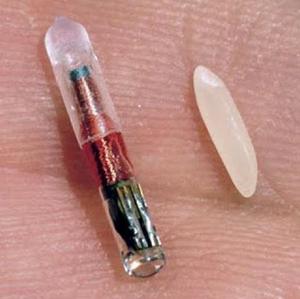|
Three Square Market, a Wisconsin-based company, announced that is it about to become the first in the U.S. to offer microchip implants to their employees, at the cost of the company. Each RFID chip (Radio-Frequency Identification) is about the size of a single grain of rice, which will be implanted between a person's thumb and forefinger. Each microchip will cost roughly $300 and will allow the employees to enter the building, purchase items in the break room, login to their computers, and use the copy machine. But those certainly are not the limits of the chip. “Eventually, this technology will become standardized allowing you to use this as your passport, public transit, all purchasing opportunities, etc,” Three Square Market CEO, Todd Westby, said. Westby added the RFID data is both encrypted and secure and that, "there's no GPS tracking at all."
Three Square Market designs software for break room markets that are commonly found in office complexes. According to Westby, the end goal of this move is to allow people to purchase items using a microchip implanted inside a person's hand, similar to using a smart phone. "We'll come up, scan the item," he explained, while showing how the process will work at an actual break room market kiosk. "We'll hit pay with a credit card, and it's asking to swipe my proximity payment now. I'll hold my hand up, just like my cell phone, and it'll pay for my product." A Worldwide Phenomena One Swedish rail company, SJ, has been offering passengers the option of using a biometric chip implanted into their hand in lieu of a paper train ticket. The tiny chip has the same technology as Oyster cards and contactless bank cards – NFC (Near Field Communication) – to enable conductors to scan passengers’ hands. The convenience is only applicable to those who already have the biometric implant, as SJ is not offering to chip people. Around 2,000 Swedes have had the surgical implant to date, most of them employed in the tech industry. State-owned operator SJ has said it expects about 200 people to take up the microchip method, but users must be signed up as a loyalty program member to access the service. Customers buy tickets in the normal way by logging onto the website or mobile app, and their membership number, which is the reference code for the ticket, is linked to their chip. While this technology is relatively old, there are still kinks to be ironed out with the system. Some passengers’ LinkedIn profiles were appearing instead of their train tickets when conductors scanned their biometric chip, while a number of train crew haven’t got the new SJ app which facilitates the scanning of biometric chips yet. Reactions to the idea have been largely positive they said, although some security issues have been raised. “Of course there’s mixed reactions. Some people are concerned with the privacy issue and that’s something we take really seriously. We came up with using the membership number which doesn’t tell anyone anything – a third party couldn’t make anything of it even if they got hold of it", says SJ’s spokesperson. “Some people are confused and think they can be tracked via microchip – but if that’s something they’re worried about, they should be more concerned by their mobile phone and credit card use. You can already be tracked in many different ways other than a microchip.” Although anonymity is a serious struggle in modern society, collectively we should choose privacy over convenience when it comes to adopting "advancements" like these. By voluntarily participating in these programs, you consent to your data being collected and analyzed, justifying the process for other people to join. Let us keep in mind that this technology is very old, as new biometric identification systems are being utilized worldwide. What could go wrong? ReferencesCoffey, H. (2017). This Swedish rail company is letting commuters pay using microchips in their hands. The Independent. Retrieved 28 July 2017, from http://www.independent.co.uk/travel/news-and-advice/sj-rail-train-tickets-hand-implant-microchip-biometric-sweden-a7793641.html
Rosenthal, J. (2017). Wisconsin Company to Implant Microchips in Employees. KSTP. Retrieved 26 July 2017, from http://kstp.com/news/wisconsin-company-to-implant-microchips-in-employees-three-square-market/4549459/#.WXVQVSc74iY.twitter
0 Comments
Leave a Reply. |
This feed contains research, news, information, observations, and ideas at the level of the world.
Archives
May 2024
Categories
All
|


 RSS Feed
RSS Feed

